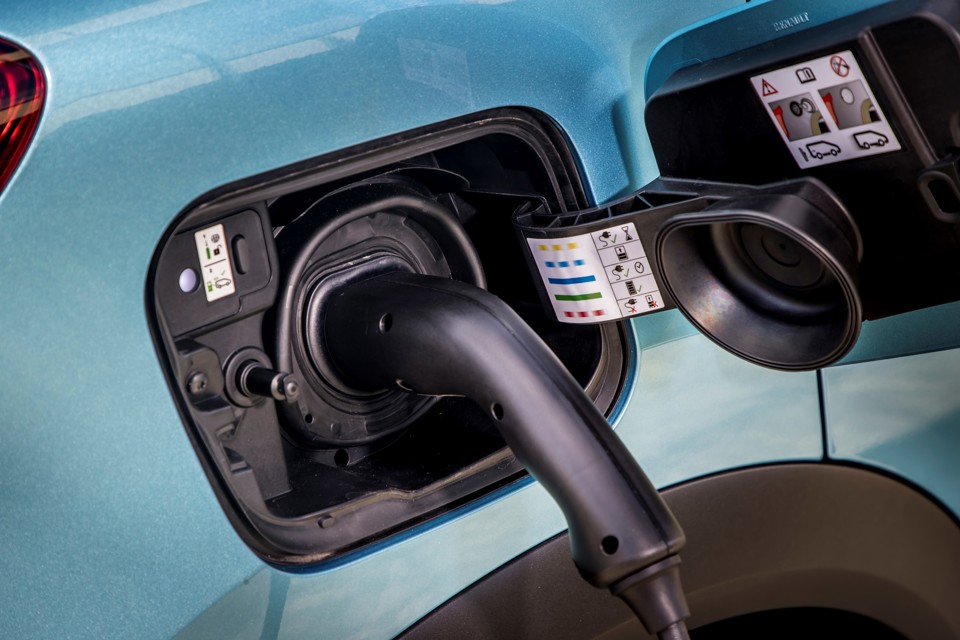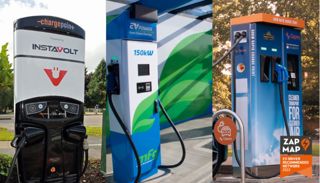The Government has cut the plug-in car and van grant rates, and changed the eligibility criteria.
The plug-in grant scheme has supported almost half a million electric vehicles (EVs) over the past decade. But, with sales of zero-emission cars up by 89% and plug in van orders already more than 250% higher than in 2020, ministers have decided to reduce the grant.
The Plug-in Car Grant (PiCG), which had given consumers 35% off the purchase price of an EV up to a maximum of £2,500, has been cut by £1,000 to £1,500.
The eligibility criteria for the plug-in car grant has also changed. Cars with a recommended retail price (RRP) of £35,000 or less had been eligible, but that has now been reduced by £3,000 to £32,000 or less.
Furthermore, hybrid electric cars, which had CO2 emission of less than 50g/km and could travel at least 112km (70 miles) without any emissions, are no longer eligible.
In terms of the Plug-in Van Grant (PiVG), the grant rate for light commercial vehicles (LCVs) has also been cut.
For small vans, 2.5 tonnes gross vehicle weight (GVW) or less, the grant had given consumers 35% off the purchase price up to a maximum of £3,000. That has now been cut to £2,500.
For larger vans, 2-3.5 tonnes GVW, the grant has also been reduced, from a maximum of £6,000 to £5,000.
There are no changes to grant rates for vehicles over 3.5 tonnes.
"We’re concerned the Government has taken this step too soon," Nicholas Lyes, RAC
In an email to plug-in grant portal users, the Office for Zero Emission Vehicles (OZEV) said: “In order to make our available funding go further and help more businesses and consumers to make the switch, we are re-focusing our vehicle grants on the more affordable vehicles, reducing grant rates and limiting the number of van grants available to 1,000 per customer per year.”
The new terms, says OZEV, apply from 7am today (Wednesday, December 15) and the grant portal has been temporarily suspended as it transitions to the new rates.
OZEV explained: “Government has a responsibility to manage the grant budget and to deliver value for money for taxpayers and as signalled to industry following the March 2021 grant changes, has therefore been unable to provide notice ahead of the grant changes.”
It says that it will allow dealers or vehicle manufacturers to claim for any orders that were placed by customers in the seven consecutive days before the grant rate change which were not logged on the portal.
This means that any orders placed by customers between 12.01am on December 8 and 11.59pm on December 14, before the grants rate changed that had not yet been logged on the portal, will be paid at previous rates and eligibility criteria.
"The market is charging ahead in the switch to electric vehicles," said transport minister Trudy Harrison. "This, together with the increasing choice of new vehicles and growing demand from customers, means that we are refocusing our vehicle grants on the more affordable vehicles and reducing grant rates to allow more people to benefit, and enable taxpayers’ money to go further.
"We want as many people as possible to be able to make the switch to an electric vehicle, which is why we will also be introducing new rules to make it easier to find and pay at chargepoints.
"This will ensure drivers have confidence in our charging infrastructure, as we look to reduce our carbon emissions, create green jobs and level up right across the UK."
The market responded to the last changes to the plug-in grants with car manufacturers dropping prices for 18 zero emission models to meet the elgibility criteria. It remains to be seen whether they will follow suit this time.
Interestingly, the reduction comes as more than three quarters (77%) of respondents to KPMG's Annual Global Automotive Executive Survey said that they believe EVs can be adopted widely by 2030 without Government subsidies. However, 91% of global executives said they supported such programmes.
Richard Peberdy, head of automotive at KPMG UK, said: “Today’s grant cut reduces consumer incentivisation to make the switch to electric vehicles, at a time when inflation is rising and wider economic uncertainty continues.
"Although the timing of this decision is questionable, the automotive industry remains confident about the path to net zero.
"Our recent global automotive survey suggests that industry executives see a strong need for subsidy schemes right now to aid the transition to EVs.
"But, over three quarters of executives told us that even if subsidy schemes were totally removed, EV adoption will still be widespread by the end of this decade.”
New plug-in van grant limits
The Government has also dealt a blow to those large fleets which are electrifying vehicles by putting a limit on the number of times a they can apply.
Each business, organisation or individual may receive up to 1,000 grants each financial year (April 1 to March 31). Limits apply to end customers and not to lease companies.
Orders placed on the portal before 7AM on December 15 will not be counted towards this year’s limits.
Existing per customer and total limits on plug-in truck grant orders will continue to apply.
The move, says OZEV, will ensure that the plug-in van grant scheme is “sustainable” and to ensure fair distribution of the grant across stakeholders.
Motorcycle and moped grants will also be changing, with the Government now providing a 35% discount up to a maximum of £500 off the cost of a motorcycle, and £150 for mopeds, with a price cap on vehicles of £10,000.
It had been offering a 20% discount up to a maximum of £1,500 off the cost of both electric motocycles and mopeds.
Almost 50% of mopeds sold this year were battery electric, it says, with some models now at price parity with their internal combustion engine equivalent. These changes and the new price cap will target funding where it is really needed to support the transition to zero emission two-wheelers.
The total funding committed by the Government to support the transition to zero emission vehicles is £3.5 billion. This includes recent investments like an additional £350 million to support the electrification of UK vehicles and their supply chains, as part of its £1bn commitment, and a further £620m for EV grants and infrastructure, with a focus on local on-street residential charge points.
Adding end customers to the grant portal
To monitor the plug-in van grant limit and ensure that grants are fairly allocated, OZEV is also introducing a requirement that orders across all of the grant schemes must now include a valid ‘end customer’ when they are created on the portal.
Where the order is a lease order this means the lease company’s customer not the lease company themselves.
Any claims made without this information or found to contain the wrong customer details will be cancelled, it says.
RAC head of roads policy, Nicholas Lyes, labelled the plug-in grant cut "disappointing", with only 16 EV models now eligible for the grant.
"RAC research suggests that drivers already feel the upfront cost of electric vehicles is too high, so this has to be seen as a step in the wrong direction," he added. "With a little luck, additional models coming on to the market will help negate the Government’s cut to the plug-in car grant. In the meantime those wanting to make the switch may be well advised to take advantage of more affordable leasing options.
“While it’s true that sales of electric vehicles have been growing strongly, it’s worth noting that this is still from a relatively low base. We’re concerned the Government has taken this step too soon.”
READ MORE INDUSTRY REACTION TO THE PLUG-IN CAR AND VAN GRANT CUT
> Interested in comparing electric vehicle data? Check out our EV tool.
> Interested in ensuring the efficient use of EVs. Check out our dedicated editorial sections: Insight & policy | EV news | Charging & infrastructure | Costs & incentives | Benefit-in-kind | EV case studies | EV road tests























Login to comment
Comments
No comments have been made yet.